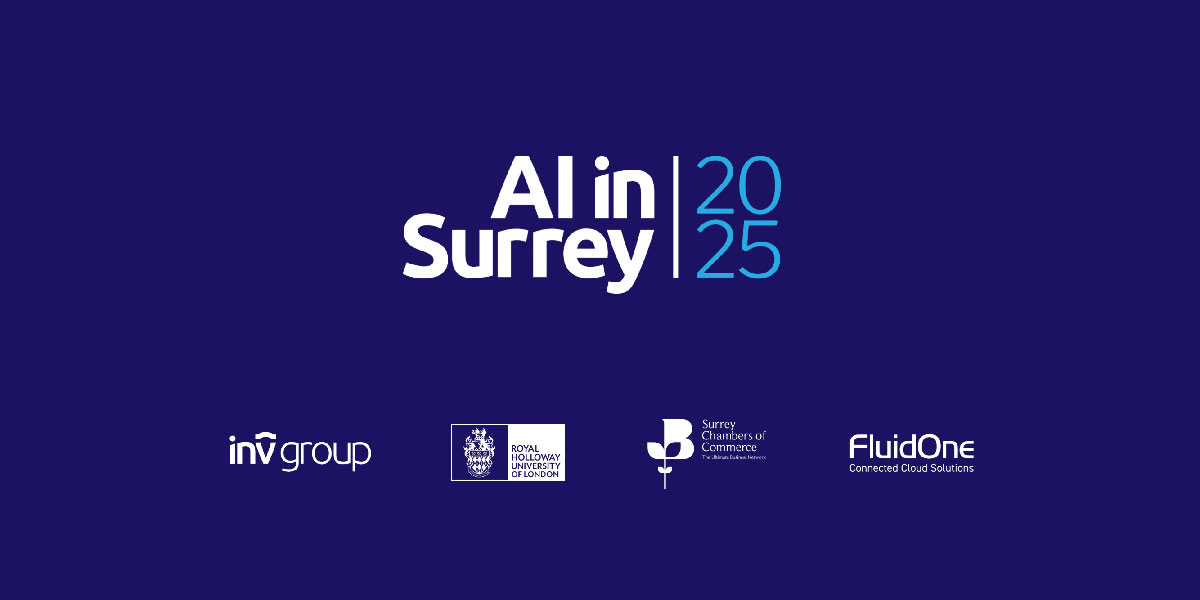31st December 2023
As 2023 draws to a close, the digital landscape continues to evolve at breakneck speed. From the realignment of hybrid working and the reshaping of the workforce to the rebuilding of cryptocurrencies and the continuing investments in the metaverse, we’ve seen a great deal of change in the past 12 months. But there’s no doubt that the story of 2023 has been dominated by one topic: AI.
Major advances in AI have dominated the headlines. Investments in new AI ventures have rocketed. Meanwhile, AI is seeping into every facet of our lives, from the mundane (recommending your next Netflix show) to the profound (predicting your health based on your sleeping patterns). Individuals and organizations across the public and private sectors have flocked to the latest wave of generative AI solutions in record numbers. By the end of 2023, extensive investment and experimentation in generative AI tools in almost every part of the economy is widely reported. Even more is planned for the next 12 months.
While this progress is exciting, it has also sparked a growing sense of unease. Indeed, the real story of 2023 may not be the deployment of AI itself, but the wakeup call it has provided as we face important questions being raised by this new wave of AI. Now more than ever, we see that the digital world stands at a crossroads. As expectations surrounding AI’s impact reach a fever pitch, so too do calls for a greater focus on its responsible development and use. Which path we’ll take, and the implications of the choice we make, are far from clear.
Dilemma #1: Privacy vs. Progress
The insatiable appetite of AI algorithms for data fuels innovation, but it also raises concerns about how that data is gathered, managed, tagged, and used. Facial recognition, social media tracking, and even smart home devices generate mountains of personal data, often with murky consent or transparency. This dilemma pits the convenience and benefits of AI against the fundamental right to privacy. Can we find a balance, or are we destined to trade one for the other?
In 2023, we saw this challenge most clearly as public sector organizations began to deploy AI-powered smart infrastructure in areas such as policing, health monitoring, and traffic management. Examples becoming more common include facial recognition cameras used to identify suspects in crowded spaces, CCTV used to monitor traffic flow by optimizing routes and reducing congestion, and smart sensors in buildings and homes to detect air pollution and look for defects. These advancements undeniably improve our daily lives, but at what cost?
Constant surveillance raises a variety of concerns about privacy intrusion. Who owns the data collected by these systems? How is it used? Can it be accessed by unauthorized individuals or organizations? The nebulous nature of consent further complicates the issue. Are citizens and residents truly aware of the extent to which their data is being collected and used, or are they simply opting into convenience without fully understanding the implications? Broad surveys conducted through 2023indicate that there is a great deal of scepticism about AI-powered data collection and widespread concern about how such data is secured, managed, traded, and used.
The dilemma becomes even more apparent when considering personal health data. AI algorithms trained on medical records can predict disease outbreaks, personalize treatment plans, and even identify individuals at risk for developing certain conditions. This has the potential to revolutionize healthcare at a time when cost efficiencies and quality improvements are essential to relieve pressures on both healthcare systems and professionals. However, it also raises concerns about data security and potential discrimination. Imagine a scenario where an individual’s genetic data is used by an insurance company to deny coverage or by an employer to make hiring decisions based on perceived health risks. These are the kinds of issues being faced today.
The challenge lies in finding a balance between the undeniable benefits of AI and the fundamental right to privacy. As we see in emerging AI regulations, this is leading to a multi-pronged approach in which AI is developed and used within a well-defined governance framework involving:
- Transparency and accountability: Individuals need to be clearly informed about how their data is collected, used, and stored. Organizations employing AI should be held accountable for data breaches and misuse.
- Stronger data protection laws: Governments must enact and enforce robust data protection laws that give individuals control over their personal information.
- Technological solutions: Developers should prioritize privacy-preserving technologies, such as anonymization and differential privacy, that allow AI to function without compromising individual data.
- Public education and awareness: Raising public awareness about the implications of AI and data collection is crucial to fostering informed consent and encouraging responsible use of technology.
However, the past year has also highlighted that the “Privacy vs. Progress” dilemma is not a zero-sum game. It’s a tightrope walk, demanding constant vigilance and a commitment to finding solutions that protect individual rights while allowing AI to flourish. The hope is that by encouraging active engagement in this conversation and implementing robust safeguards, we can ensure that the benefits of AI are shared equitably and responsibly, without sacrificing the fundamental right to privacy that underpins a free and democratic society.
Dilemma #2: Automation vs. Employment
For several years, AI-powered automation has been transforming industries, replacing manual tasks with algorithms and robots. While this promises increased efficiency and productivity, 2023 has seen the focus on the impact of AI on jobs broaden to many more areas of the economy with the fear being raised that it threatens widespread unemployment across many areas of professional services. How can we ensure that the benefits of automation are shared equitably, and that displaced workers are equipped with the skills to thrive in the new digital economy?
This dilemma, the tension between automation and employment, has been highly visible in 2023. For example, consider the case of the trucking industry. Self-driving trucks, touted for their safety and fuel efficiency, could potentially replace millions of truck drivers. While this promises cost savings and potentially safer roads, the potential human cost could be staggering. The livelihood of countless families, often already struggling in an increasingly competitive economy, may be badly affected. The question then becomes, how can we ensure that the benefits of automation are shared equitably? Can we navigate this path without leaving a trail of unemployment and economic hardship?
One crucial approach to address this dilemma lies in reskilling and upskilling the workforce. By investing in training programs that equip displaced workers with the skills needed for the digital economy, the aim is to turn them from victims of automation into its beneficiaries. This could include training in data analysis, robotics, cybersecurity, and other fields poised for growth in the coming years. Finding, building, and retaining the right digital skills has been a major focus for 2023.
Another potential solution is the concept of Universal Basic Income (UBI), an approach receiving renewed attention in 2023. Providing a guaranteed minimum income to every citizen, regardless of employment status, could offer a safety net for those displaced by automation while stimulating the economy through increased consumer spending. Recent comments by several prominent digital players such as Elon Musk have added additional spice to this debate, galvanizing those on both sides of the argument.
Ultimately, addressing the automation vs. employment dilemma is driving a collaborative effort. Businesses, governments, educational institutions, and individuals are looking to work together to ensure a smooth transition into the future of work. A great deal of recent attention is now being focused on how to ensure a future where automation does not create a chasm between the haves and have-nots, but one where its benefits are shared by all.
Yet, managing the path forward for AI automation is not without its challenges. Implementing effective reskilling programs, navigating the political complexities of wealth distribution, and ensuring responsible AI development are all daunting tasks. The potential rewards – a future where automation empowers rather than disenfranchises – are too great to ignore. Significant events in 2023 such as the AI safety summit at Bletchley Park brought a wide community together to consider ways forward and raised hope that by embracing a spirit of collaboration and innovation we can ensure that the age of the algorithm becomes not a time of fear and uncertainty, but a time of shared prosperity and progress.
Dilemma #3: Bias vs. Fairness
AI algorithms are not immune to human biases. When trained on data susceptible to human prejudice, they can perpetuate and even amplify discrimination. In 2023 we saw how this dilemma manifests in everything from biased hiring practices to unfair loan approvals. How can we ensure that AI is used ethically and responsibly, promoting fairness and inclusivity in a world increasingly shaped by algorithms?
The promise of AI lies in its ability to analyze vast amounts of data, leading to objective and efficient decisions. Yet, this promise is tarnished by a hidden flaw: bias. Consider a financial institution using AI trained on historical data to decide on loans. While this data-driven decision making undoubtedly enhances efficiency, it has been found that using this data derived from a variety of historical actions might reflect systemic biases in access to credit, disproportionately favouring certain demographics over others. As a result, the algorithm might systematically deny loans to individuals from marginalized communities, even if they are financially qualified.
Over the past year, institutions around the world have been highlighting the need to address algorithmic bias to ensure that AI is used ethically and responsibly, promoting fairness and inclusivity in a world increasingly governed by algorithms. This starts with scrutinizing the data used to train AI models to identify and mitigate potential biases. This could involve diversifying datasets, removing discriminatory features, and employing techniques like fairness-aware data augmentation.
Also, key to progress are AI decision-making processes that are more transparent and understandable. This allows for identifying and addressing biases within the algorithms themselves, ensuring that they are not operating without appropriate accountability. One approach is to implement mechanisms for human oversight of AI systems, ensuring that algorithmic decisions are ultimately subject to human review and ethical considerations. This is crucial to prevent discriminatory outcomes and hold developers and users accountable for their actions.
A contributing factor to bias in AI systems is the lack of diversity in the teams responsible for AI development. Fostering diversity and inclusion in AI development continues to be an issue in 2023. Better systems result from encouraging diverse teams of engineers, data scientists, and ethicists to develop and deploy AI systems. This can help to identify and address biases from various perspectives, leading to more fair and inclusive outcomes. Throughout 2024, this issue will undoubtedly continue to cause concern.
However, we all know that addressing bias in AI is not a one-time fix. It requires continuous vigilance, ongoing research, and a commitment to ethical development and deployment. We must constantly interrogate the data we use, the algorithms we design, and the systems we build, ensuring that they serve as tools for progress, not instruments of discrimination. By prioritizing fairness and inclusivity, we can ensure that AI becomes a force for good, empowering individuals and building a more just and equitable society.
Dilemma #4: Control vs. Autonomy
As AI becomes more sophisticated and widely deployed, the question of control has become increasingly pressing. Who is ultimately responsible for the decisions made by AI systems? Who pulls the plug when things go wrong? This dilemma raises profound questions about the future of human agency and autonomy in a world increasingly governed by machines. It has even led some experts to call for a pause in AI development to allow time for reflection on its future directions.
However, pressure to keep moving forward seems overpowering. In 2023, military conflicts in Ukraine and Gaza have highlighted for many people the critical concerns we face as AI becomes more autonomous in decision making. The Ukraine conflict has even been described as “a living lab for AI warfare”.
Perhaps the most visible example here is the use of military drones equipped with AIcapable of identifying and targeting enemies. Many aspects of their use are widely debated. In the heat of battle, if the algorithm makes a fatal decision, misidentifying civilians as combatants, who is to blame? The programmer who coded the algorithm? The commander who deployed the drone? Or the AI itself, operating with effective autonomy? Such scenarios highlight the challenges of autonomous machines making life-or-death decisions, potentially beyond human control and accountability.
To address this intricate maze of control and autonomy requires a careful balance to be struck. For many, maintaining a human-in-the-loop of decision making is essential to ensure human oversight for critical decisions, with AI acting as an advisor or decision-support tool. This could involve requiring human authorization before autonomous systems take actions with significant consequences.
However, it also requires a focus on transparency and explainability of AI decisions. Demystifying AI algorithms requires making their decision-making processes transparent and understandable to all. This allows for human intervention when the logic behind an AI decision appears biased or flawed. The extent to which this is possible with the current complexity of AI algorithms is widely debated.
Yet, at the heart of a controlled approach to AI is a strong ethical governance framework. In 2023 we have seen several organizations working to establish a robust ethical framework for AI development and deployment, emphasizing principles like accountability, fairness, and human oversight. These frameworks can guide developers and policymakers in navigating the complex implications of algorithmic control. Recently released frameworks such as NIST’s AI risk management frameworkwill see much wider use over the coming months.
More broadly, current AI regulation efforts in both Europe and the USA are looking to find the ideal scenario where they avoid stifling AI advancement with excessive control to find a sweet spot where autonomy fuels progress while remaining true to ethical principles and human accountability. As can be expected, different countries are taking different approaches. In 2023 we saw the release of several sets of guidelines including a consolidation of China’s rules on AI deployment, President Biden’s executive order on the safe, secure, and trustworthy Development and Use of AI and the UK Government’s white paper on its plans for AI regulation.
Whether these strike the right balance between control and autonomy remains to be seen, and can only be assessed within their specific cultural and political contexts. Regardless, adoption of these guidelines will require open dialogue, collaboration between technologists, policymakers, and the public, and a constant vigil against the potential misuse of autonomous AI. Ultimately, the relationship between human control and AI autonomy will be a complex and evolving issue. We will be required to continuously adapt and refine our approaches as AI capabilities advance. Over the coming months, this will be seen in legal and regulatory frameworks, redefining the boundaries of human responsibility, and fostering a culture of ethical AI development.
The Failing: A Lack of Trust
Throughout these dilemmas, a common thread emerges: a disturbing lack of trust in AI. Throughout 2023 we saw that many people distrust the algorithms that shape our lives, the companies that collect our data, and the governments that regulate them. This failing of trust jeopardizes the foundation of a healthy digital society. Without trust, collaboration, and open dialogue, we risk creating a future where technology alienates rather than empowers.
Unfortunately, recent evidence shows that we are witnessing an increasing lack of trust in AI. Across the algorithms that curate our newsfeeds, the companies that vacuum up our digital footprints, and the government agencies tasked with ensuring responsible technological development, open questions are being raised about whether we’re on the right track. This trust deficit isn’t just a minor inconvenience; it’s a growing chasm threatening the very foundations of a healthy and equitable digital society.
Perhaps one of the main reasons for an increasing lack of trust in AI is its growing role in generating misinformation and deep fakes, and the way AI is being used to mislead individuals. In the past year, the use of AI to influence individuals and communities has been highlighted. With major elections in the UK and USA planned for 2024, concerns have been raised about the extent to which AI-driven influencing will play a part in the results.
Broader concerns are also being raised about AI’s influence on what people see and hear online, and the provenance of that information. Many fear that without trust in information sources, informed discourse and collaborative problem-solving become practically impossible. For example, with current digital technology, when an individual is scrolling through social media feeds, rather than see a balanced mix of viewpoints on a controversial issue, they will see a narrow stream of information based on their previous online viewing habits. While such personalization of content to an individual’s preferences can be efficient, it also reduces choice and confirms their existing biases. This can be manipulated by AI algorithms restricting access to some information sources and generating content that reinforces pre-existing beliefs, deepening societal divides and eroding faith in objective facts.
But also highlighted in 2023 have been the broader geo-political considerations raised by the wider deployment of AI. As the deep impact of AI grows, the political considerations of China, Europe and the US have become more evident in role that these governments play in AI’s development. Not only is each of these state actors looking to manage access to AI capabilities within its jurisdiction, we also find that a new form of “AI cold war” has emerged in which access to the technologies that underpin AI are being restricted. This is having broad implications on how AI is being deployed across the world and raising concerns about the way AI is used or manipulated to support the state.
As a result, a key question facing us today is how we bridge this chasm and rebuild trust in the digital age. A starting point for many companies and governments is to commit to transparent data practices, clearly outlining how information is collected, used, and protected. This includes regular audits, accessible privacy policies, and clear avenues for redress for data breaches. As we have seen in recent discussion about Generative AI tools, there are circumstances where it is far from clear how to resolve issues such as provenance, ownership, copyright, and Intellectual Property (IP) with some aspects of AI. It seems as if these discussions still have a long way to go.
Empowering individuals with greater control over their data and online experiences is one possible approach to improved data management that has been receiving increased attention in 2023. This could involve tools such as the Hub-of-All-Things to provide people with personal data stores, more granular privacy settings, and enhanced education on data use to foster digital literacy. This includes support for use of ethical frameworks for AI development and deployment, prioritizing fairness, non-discrimination, and human oversight.
Perhaps the most essential step, however, is fostering open and informed public discourse about the implications of AI technology on society. This includes engaging diverse voices, actively listening to concerns, and collaborating with civil society, academics, and technologists to develop responsible solutions. In this way, rebuilding trust in the digital age will become a shared responsibility demanding commitment from everyone – individuals, companies, policymakers, and technologists. In 2023 we saw increasing calls for a more informed public discourse on how we prioritize transparency, accountability, and ethical development, ensuring that technology is seen to be empowering rather than alienating force, fostering a future where trust fuels progress and innovation benefits all of us. This will surely continue over the coming months.
The Year in Review
There is no doubt that 2023 was the year AI truly gained a foothold in all our lives. Generative AI advancements dominated headlines, encouraging organizations to experiment with its potential. Much was achieved to bring increasing intelligence to core processes and improve data-driven decision making. However, while this widespread investment in AI pushed many organizations in the public and private sector forward in their digital transformation efforts, perhaps 2023 will most be remembered for making us wake up to fundamental dilemmas that remain unresolved.
As AI-driven systems gathered more data, privacy concerns collided with progress. Surveillance and data ownership became central issues, prompting calls for transparency, stronger data protection laws, privacy-enhancing technologies, and increased public awareness. Balancing AI’s benefits with individual rights became a crucial challenge.
Meanwhile, the fear of automation replacing jobs sparked discussions about upskilling and concepts like Universal Basic Income have reappeared on the agenda. These concerns were further amplified by exposed biases within AI algorithms, raising questions about fairness and ethical assessment. The tension between human control and AI autonomy underscored the need for transparent decision-making and robust ethical governance.
Confronting these dilemmas has exposed a fundamental flaw: a lack of trust in AI, data practices, and governance. Perhaps the most important lesson from 2023 has been that rebuilding trust requires transparency, individual control over data, digital literacy, and open dialogue among diverse stakeholders. This is essential for ensuring responsible technological development and a balanced, equitable digital future where technology empowers, not alienates. One thing is sure. For all of us interested in the digital future, it looks like we’ve an exciting time ahead.






